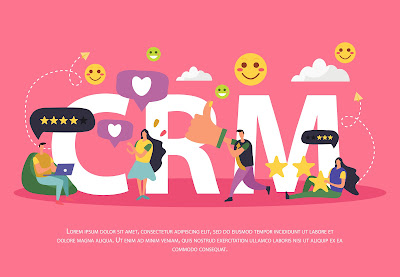The Client Expectations You Need to Understand When Choosing CRM Software
Customer
relationship management software can be a major asset to your business,
streamlining processes and saving time in the long run. However, not all CRM
software is created equal. Depending on how you plan to use it and what your
company needs from its software, one brand or another might be better suited to
your specific needs. If you’re new to the world of CRM software, choosing which
brand to trust with such an important investment can feel overwhelming. There
are so many options available that trying to determine which are best suited
for your business can seem like an impossible task. Fortunately, once you get
past the initial confusion of such a variety of choices and understand exactly
what makes one CRM software package different from another, it becomes much
easier to narrow down your options and pick the perfect one for you.
What to Look for in CRM Software
When evaluating a CRM Software system, you’ll want to consider a variety of different factors to make sure you’re choosing the best possible system for your business. Some of the most important areas to look at include: - Compatibility with other systems and devices: Make sure the CRM you select will work well with the devices and software your employees use regularly. - Ease of use: The software you choose will likely be used by a variety of different employees, and you want to make sure it’s easy enough for them to navigate without needing too much training. - Customization options: Some CRM software allows you to alter the system’s functionality to suit your needs. This can be especially helpful if your company has specific needs that aren’t met by a one-size-fits-all system. - Functionality: The software you select should include features that allow you to track all of your business’s key metrics, such as sales and marketing data, customer data, and more. - Security: While many CRM systems are safe and secure, you’ll want to ensure the one you choose has strong security features to protect your data.
What is CRM
Software?
CRM, CRM software company or customer relationship management, the software allows you to track and manage your business’s interactions with customers. Not only can it help you keep track of your customers’ details, providing you with information that can be used for future marketing campaigns, but it can also help you track your sales and service interactions, helping you identify areas for improvement that can boost your company’s performance. In addition to standard CRM features, many CRM software options provide you with the ability to create automated workflows, which can help you save time and improve your company’s bottom line. When you choose the right CRM software, it can become an integral part of your workflow, allowing you to track leads and manage your sales process more easily.
Key Things to Know About Client Expectations When Choosing CRM Software
Before you start researching and comparing CRM software options, it’s important to first consider the client expectations you’ll need your software to meet. The following are the most important expectations that any CRM should be able to meet: - Customer data: You’ll want to be able to store information about your clients, including their contact details and any important details about their business. - Data analysis: Your CRM should allow you to easily review data, identifying key insights that can help you improve your business and serve your customers better. - Customer relationship management: Your software should make it easy for you to keep track of your customers’ purchase histories, communications with your team members, and more. - Marketing capabilities: You’ll want a CRM that comes with built-in marketing automation features that allow you to create targeted campaigns without hiring an expensive marketing team. - Easy collaboration: Your CRM should allow your team members to share information easily, allowing you to track progress, stay updated on open tasks, and make informed decisions.
Core Functions You Should Be Looking for in a CRM
Depending on the unique needs of your business, you might be able to find a single CRM that meets all of your needs. However, most businesses need to find a system that includes several different features to meet all of their unique requirements. When choosing CRM software, make sure to select a system that includes the following core features: - Lead management: You’ll want to be able to track all of your leads, from the moment they first come into contact with your company until the moment they become paying customers. - Marketing management: Your CRM should allow you to create campaigns, track their progress, and measure their success, helping you improve future efforts. - Sales management: You’ll want to be able to track each customer and sale from start to finish, from the initial contact to the final transaction. - Service management: Your CRM should allow you to track your customer service efforts, including open and closed cases, providing you with important data that can help you improve your team’s performance.
Company Culture and Employee Collaboration Practices
If your company has specific collaboration practices or unique company culture standards to consider, choosing which CRM software to trust with your business can become even more challenging. Some CRM Software for Small Businesses brands might be better suited to your needs than others. For example, if your employees work across multiple time zones, you might want to select a CRM that allows you to view your data in real-time, eliminating the lag time that can create frustration and negatively impact productivity. Similarly, if your employees work in a remote capacity, you might want to find a CRM that is cloud-based so you don’t have to worry about installing software on your computers.
Cloud-Based or
On-Premises?
Finally, you’ll also want to take into consideration whether you want your CRM to be hosted by a third-party vendor or if you prefer to host it in-house on your company’s servers. While most businesses will benefit from cloud-based software, there are benefits to hosting your CRM on-premises, as well. For example, you might want to host your CRM on-premises if you work in regulated industries and need to ensure the security of your data. It’s important to remember that the decision between cloud-based and on-premises CRM software is more than a simple preference. Depending on your business’s specific needs, choosing one option over the other might be a necessity.



Comments
Post a Comment